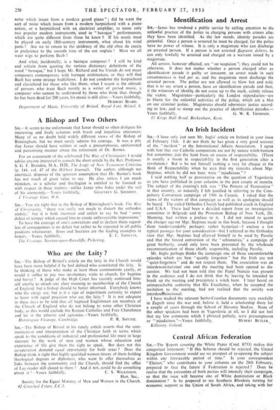An Irish Incident
SIR,-1 have only just seen Mr. Inglis' article on Ireland in your issue of February 13th. I do not think he has given a very good account of the "incident " at the. International Affairs Association. I agree with him that our Catholic compatriots are not by nature witch-hunters but sometimes join the hunt from an excess of respectability. (There is usually a boom in respectability in the first generation after a revolution.) But is he not himself cashing a very fat cheque at the Bank of Respectability when he says that my remarks about Mgr. Stepinac, which he did not hear, were " injudicious " ?
I said nothing half as prov'ocative on the question of Yugoslavia as you have published in your columns in the past couple of months. The subject of the evening's talk was "The Pattern of Persecution " in that country, so naturally I felt justified in referring to the Com- pulsory Conversion campaign of 1941 in Croatia. I asked that the views of the victims of that campaign as well as its apologists should be heard. The exiled Orthodox Church had published much in England and U.S.A. There had been a detailed report from an investigation committee in Belgrade and the Protestant Bishop of New York, Dr. Manning, had written a preface to it. I did not intend to quote the charges against Mgr. Stepinac made in this 'book, because I thought them (understandably perhaps), rather hysterical—I enclose a few typical passages for your consideration—but I referred to the Orthodox view that Mgr. Stepinac had allowed himself to be used by Pavelic and that the forced conversion of the " schismatics," a campaign of great barbarity, could only have been prevented by the wholesale excommunication of those chiefly responsible, including Pavelic.
Mr. Inglis perhaps thinks the campaign one of those uncomfortable episodes which are best "quietly forgotten " but the Irish are not "quiet-forgetters " and do not respect them. The association was an interdenominational one and the meeting had been opened to dis- cussion. We had not been told that the Papal Nuncio was present in the audience and I do not think that by leaving he intended to break up the meeting and precipitate a witch hunt. I later heard on unimpeachable authority that His Excellency, when he accepted the invitation to the meeting, had Dot .realised that the society was
interden& ina tional. •
I have studied the relevant' Serbo-Croatian documents very carefully in Zagreb since the war and, before it, held a scholarship there for a couple of years through the School of Slavonic Studies. None of the other speakers had been in Yugoslavia at all, so I did not feel that my few comments which I phrased politely, were presumptuous or " injudicious."—Yours faithfully, ' HUBERT BUTLER. Kilkenny, Ireland.


































 Previous page
Previous page